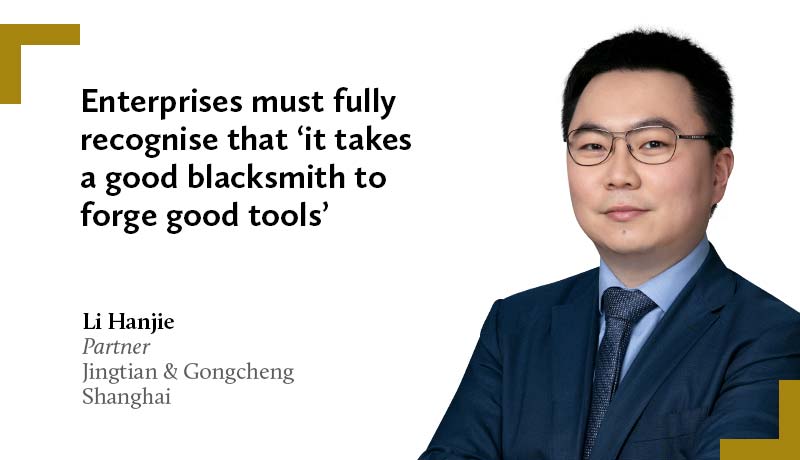Uncertainty in capital markets that had stalled Chinese companies pre-reform seems be giving way to motion as the country rolls out its intensive regulatory overhaul. Now players in various roles face fresh challenges as momentum shifts on going public. Sophia Luo reports
COMPREHENSIVE IMPLEMENTATION of the across-the-board, registration-based listing mechanism is overarching reform with far-reaching implications, leaving an indelible imprint on the development of China’s capital markets.
The success of the universal registration-based system relies on the diligent performance of market players, while rigorous enforcement of the delisting regime for listed companies, and the improvement of due diligence standards of intermediaries, pose new challenges for the industry.
Despite turbulence in domestic and overseas markets, the “going global” enthusiasm of enterprises has not subsided as China’s capital market reform picks up steam. The first batch of enterprises has successfully navigated the implementation of new regulations for overseas listing, but the regulatory authorities’ reviewing preference – along with other challenges ahead – still need to be further evaluated, and continue to be clarified in practice for a clearer path that markets so eagerly await.
Full-on implementation of the registration-based mechanism is welcomed for unifying rules across the main boards, the Star Market and ChiNext board, says Zhang Zhengyi, a partner at Llinks Law Offices in Shanghai.
Unlike the previous approval-based system, where the China Securities Regulatory Commission (CSRC) was responsible for vetting and approving IPO applications, the new two-tiered regime requires companies to be reviewed by the stock exchanges and register with the CSRC, with listing criteria including market capitalisation and profitability adopted consistently across different boards.
For the first time, says Zhang, the “functional positioning” of the main boards has been made clear, focusing on supporting high-quality enterprises known for their sophistication of business models, stable earnings performance, relatively large size, and industry representativeness.
From the perspective of supervision, “the across-the-board registration-based IPO system continues to emphasise the principle of information disclosure as the core, coupled with the openness and transparency of all vetting procedures and standards, and would-be listed companies can have better expectations,” says Zhang.
“Regulatory authorities will no longer make substantive judgment about the value or price of stocks,” she says. “Instead, issuers bear the primary responsibility for information disclosure, while intermediaries such as sponsors, law firms and accounting firms act as gatekeepers. Bourses urge enterprises to prioritise information disclosure through inquiries, and investors make value judgements on their own.”
Under the framework of the across-the-board registration-based listing mechanism, the functional positioning of each board, industry preferences and even industry entry criteria become increasingly clear, with differences across different sectors increasingly obvious.
Aside from the main boards, Zhai Xiaojin, a partner at Tian Yuan Law Firm in Shanghai, notes: the Star Market places greater emphasis on “hardcore technology” attributes; the ChiNext board mainly targets startups with high prospects in innovation, creation, creativity and new technology, new industry, new business forms and models; and the Beijing Stock Exchange focuses on serving small and medium-sized enterprises such as specialised and sophisticated enterprises that produce new and unique products.
“Each board has traits of its own with some overlapping,” says Zhai. Hence, it is vital for companies to choose the suitable listing board in line with their own sector and development.
Leo Lou, a partner at Fangda Partners in Shanghai and Guangzhou, says that if the positioning and industry attributes fail to meet the requirements of the board they apply for, “the preparatory efforts for going public may be in vain”.
Since A shares officially entered the new era of the “universal registration-based system” a few months ago, Lou has noticed an increase in the amount of terminations and a short-term drop in the actual passing rate of IPOs. He says the trend results from issuers’ positioning failing to meet board requirements, the active withdrawal of material triggered by regulators’ on-site inspections, and declining earnings performances. It is a major trend that cannot be ignored, he adds.
Li Hanjie, a Shanghai-based partner at Jingtian & Gongcheng, says that although the registration-based IPO mechanism lowers the threshold of revenue, profit and asset size, it sets a higher bar for enterprises’ independent patents, core technologies, and research and development (R&D) investment.
“Such a ‘sifting from the top’ mechanism means companies must overcome the challenges of a long R&D period, high failure rates, and a huge volume of working capital,” says Li. “More time and effort must be invested to make the grade. Given the macro adjustment in pricing logic of capital markets, enterprises must fully recognise that ‘it takes a good blacksmith to forge good tools’.”
As registration-based listing places great emphasis on information disclosure, intermediaries are required to assume greater responsibilities, requiring more stringent and careful pre-IPO work of verifying and rectifying company’s non-standard behaviour than ever before.
Lou says this has led to a general and noticeable slowdown in the pace of IPO applications. Companies seeking listing will eventually still have to return to a focus on going-concern ability and internal control compliance.
In terms of the focal point during intermediaries’ vetting process, Zhai says: “The authenticity of financial figures, in particular, can directly become a matter of life and death at the project level for would-be listed firms and even intermediaries. Therefore, it’s important not to leave things to chance.”
Looking at the across-the-board registration-based IPO mechanism from a more strategic perspective, its success depends on market players performing their own duties.
For regulators, a core design philosophy of the system is to leave the choice to the market, says Lou. This requires regulators to take concrete action to prevent the system from turning into another form of approval-based mechanism, and further clarify the relationship between the government and the market.
“For issuers and intermediaries, the full-on implementation of the registration-based system means ‘loose access and harsh penalty’,” says Lou. “They must abandon the idea of applying with problems concealed and unreported, and strive for better checking and information disclosure. Issuers and intermediaries are in essence complementary and indispensable, but trust and interaction between the two still needs to be consolidated by market practices.”
You must be a
subscribersubscribersubscribersubscriber
to read this content, please
subscribesubscribesubscribesubscribe
today.
For group subscribers, please click here to access.
Interested in group subscription? Please contact us.
你需要登录去解锁本文内容。欢迎注册账号。如果想阅读月刊所有文章,欢迎成为我们的订阅会员成为我们的订阅会员。
Practitioner’s Perspective Article Series
Registration-based IPO review brings new philosophyBy Kang Xiaoyang, Kangda Law Firm |
 |
Securities service institutions’ duties under comprehensive registrationBy Han Xu and Hao Jingmei, Guantao Law Firm |
 |
Filing rules, main focuses for overseas listingBy Wang Bo and Peng Caixia, Commerce & Finance Law Offices |
 |
Foreign exchange registration after dismantling a red chipBy Yang Ke and Zhang Qi, Tian Yuan Law Firm |
 |
SEHK lures new-economy industries with reformsBy Li Tao, Han Kun Law Offices |
 |
Selecting the right listing for technology specialistsBy Spring Zhang and Grace Zhao, Brightstone Lawyers |
 |
Responding to IPO scrutiny over medical device distributionBy Baker Chen and Fiona Zhu, Llinks Law Offices |
 |

























